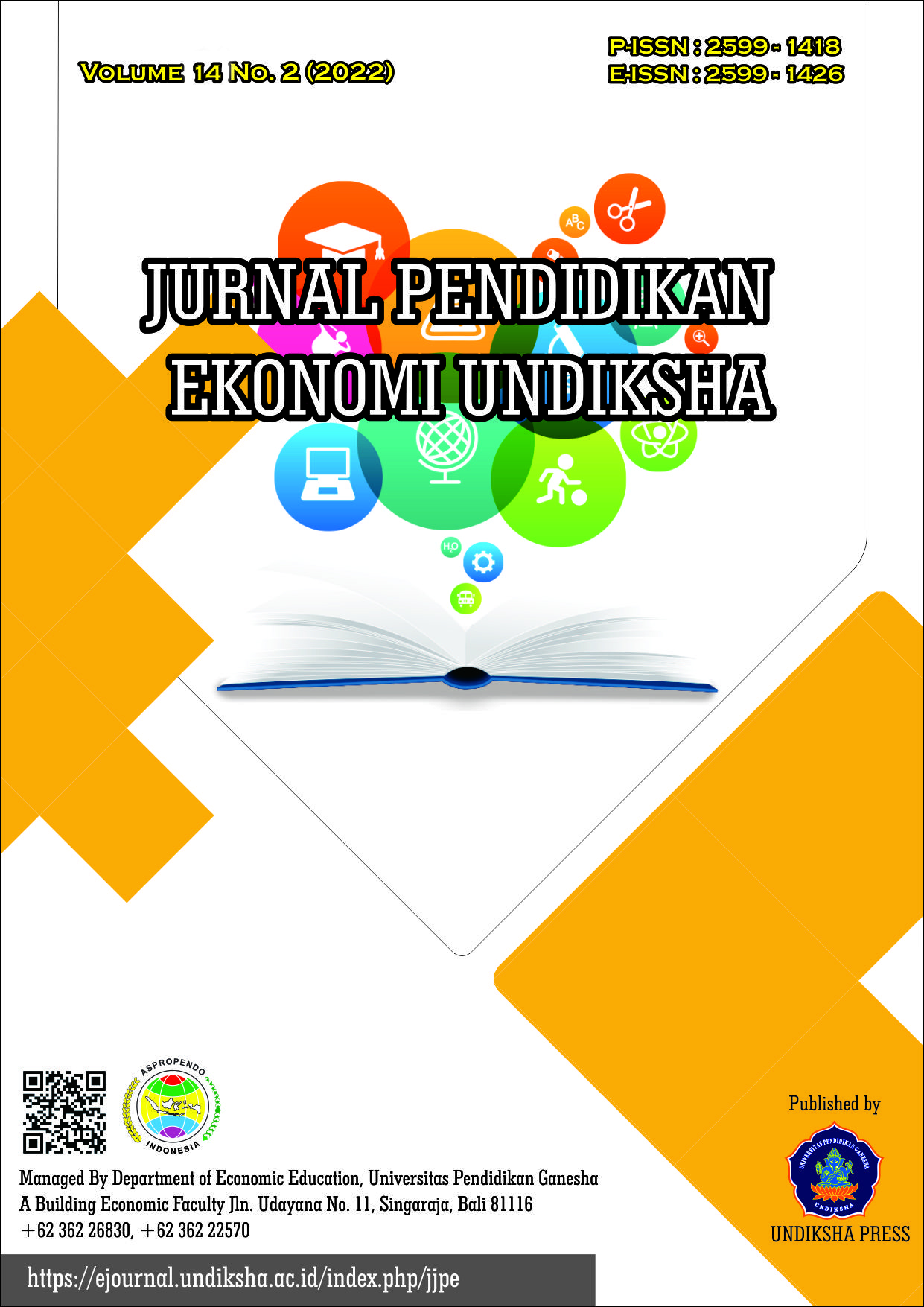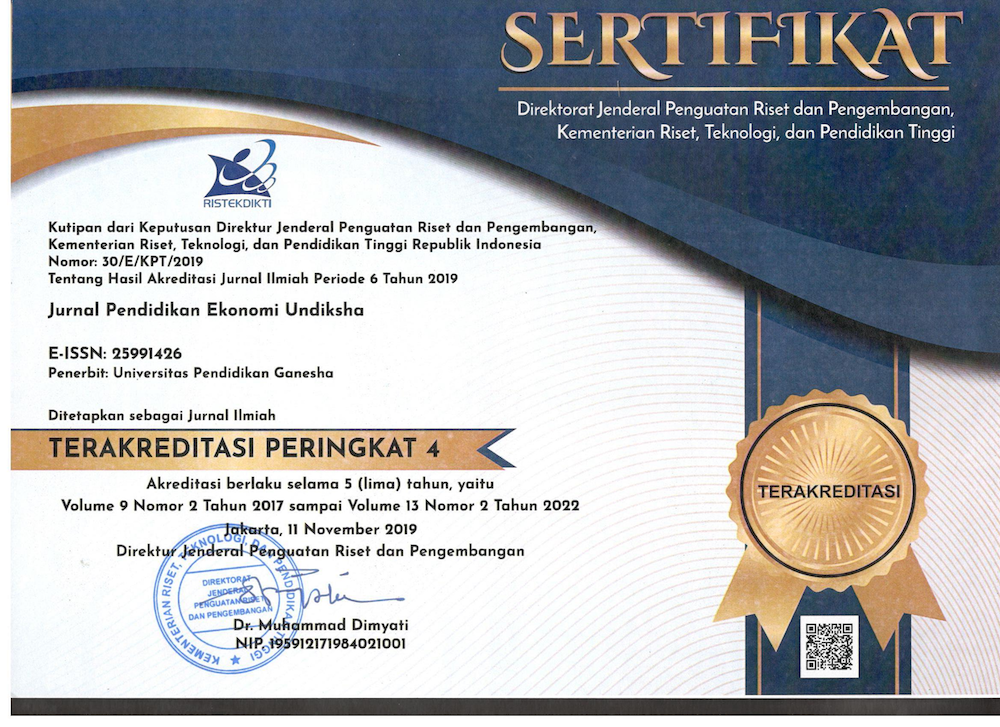Pengembangan Buku Teks Berbasis Pembelajaran Saintifik Pada Mata Pelajaran Akuntansi Perbankan Syariah Untuk Kelas XI Kompetensi Perbankan Syariah SMK
DOI:
https://doi.org/10.23887/jjpe.v14i2.51207Keywords:
Akuntansi Perbankan Syariah, Bahan Ajar, Buku Ajar, Pendekatan Saintifik.Abstract
This development research produces textbooks using scientific steps at the core learning activities. The purpose of this study is to analyze the process of developing textbooks, analyze the feasibility of textbooks, and analyze students' responses to textbooks based on scientific approaches on the subjects of accounting of Islamic banking. The type of research used is Research and Development (R&D) with the 4D development model developed by Thiagarajan without doing the disseminate stage. The subjects of this study were students of class XI Islamic Banking at SMK Negeri 1 Lamongan. The results of this study show the average results of the feasibility of textbooks as determined by experts to be 85.34 percent in the very valid category. The content feasibility component shows a result of 86.15 percent with a very valid category, the presentation feasibility component is at 82% with a very valid category, linguistic component is at 100% with a very valid category, and the graphics component is at 99.57 percent with a very valid category. The results of product trials also show that textbooks can attract students' interest in learning, as indicated by the percentage of 87.87% with valid categories.
References
Rusilowati, A., Nugroho, S., & Susilowati, S. (2016). Development of Science Textbook Based on Scientific Literacy For Secondary School. Jurnal Pendidikan Fisika Indonesia, 12(2), 98-105. doi:https://doi.org/10.15294/jpfi.v12i2.4252
Badan Standar Nasional Pendidikan. (2014). Naskah Akademik Instrumen Penelitian Buku Teks Kelompok Peminatan Ekonomi. Jakarta: BSNP
Dina, Adreini. (2015). The Development and Standardization of Senior High School Chemistry Textbook For Year XI at Semester I RSBI Class Based on Contents Standard of KTSP. (http:/jurnal.unimed.ac.id/2012/index.php/jpk/article/view/4269, diakses tanggal 05 Februari 2018)
Fikryyah Dwi Cahyani. 2014. Pengembangan Buku Ajar Akuntansi Berbasis Integrasi-Interkoneksi untuk Kelas XI IPS di MAN 3 Malang.(http://jurnal.um.ac.id/index.php/jabe/article/view/6059, diakses tanggal 05 Februari 2018)
Ibrohim Aji Kusuma dan Sahid. (2016). The Development of Student Worksheet Based on Scientific Approach in Linear Programming For The First Grade of Vocational Students. (http://journal.student.uny.ac.id/ojs/index.php/pmath/article/view/4608, diakses tanggal 05 Februari 2018)
Kurniasih, Imas. (2014). Panduan Membuat Bahan Ajar Sesuai Dengan Kurikulum 2013. Surabaya: Kata Pena
M. K. Abadi, H. Pujiastuti dan L. D. Assaat. (2015). Development of Teaching Materials Based Interactive Scientific Approach Towards The Concept of Social Arithmetic for Junior High School Student. (http://iopscience.iop.org/article/10.1088/1742-6596/812/1/012015/meta, diakses tanggal 05 Februari 2018)
Prastowo, Andi. (2014). Panduan Kreatif Membuat Bahan Ajar Inovatif.Yogyakarta: Diva Press
Prastowo, Andi. (2014). Pengembangan Bahan Ajar Tematik, Tinjauan Teoritis dan Praktik. Jakarta: Kencana Prenadamedia
Ranata, Artha dan Octaviana. (2017). Pengembangan Buku Ajar Akuntansi Kas Berbasis Scientific Approach Pada Mata Pelajaran Akuntansi Keuangan Kelas XI di SMK Negeri Se-Surabaya. (http://ejournal.unesa.ac.id/index.php/jpak/article/view/21343, diakses tanggal 05 Februari 2018)
Sugiyono. (2014). Metode Penelitian Pendidikan. Pendekatan Kuantitatif, Kualitatif, dan R&D. Bandung: Alfabeta
Sugiyono. (2014). Statitiska Untuk Penelitian. Bandung: Alfabeta
Yunika Putri, Agus Setyo dan Yetti Supriyati. (2015). Pengembangan Modul Pembelajaran Fisika dengan Pendekatan Saintifik. (http://journal.unj.ac.id/onj/index.php/prosidingsnf/article/download/5000/3688, diakses tanggal 05 Februari 2018).
Downloads
Published
How to Cite
Issue
Section
License
Copyright (c) 2022 Jurnal Pendidikan Ekonomi Undiksha

This work is licensed under a Creative Commons Attribution-ShareAlike 4.0 International License.





